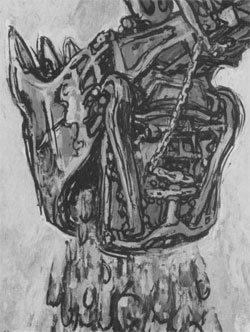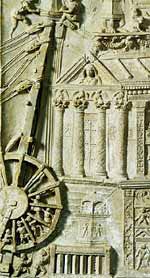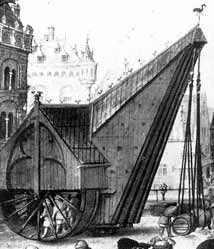Chapter 2
- (Widders Dump; an accident and an offering; dead towns; comping station)
- Further evidence that Riddley lives in the far future rather than the distant past: this is an Iron Age society that does not mine for ore, but rather digs up ancient machinery and melts it down. Working at the digging site, Riddley abruptly becomes fatherless.
I.e., I was the only one left with my name (loan is used elsewhere to mean alone); or, my name was loaned to me.
Twelve jury members; twelve disciples. Riddley has just turned 12 years old.
- (8:19) "some girt big rottin iron thing some kynd of machine"

Riddley never describes the ancient structure in any more detail, but it seems likely that Hoban had some shape in mind—if only because his first published book, What Does It Do and How Does It Work? (1959), featured his own drawings and explanations of large machines. Jamie Madden notes Hoban's "interest in things mechanical," and describes the beasts in What & How as "chthonic," since "every single machine in this book is an earth-mover." (Russell Hoban/Forty Years) In his dark, expressionistic illustrations, even a working machine looks almost as if it has already started to become one with the dirt, like the ruins at Widders Dump.
- (9:8) "a 16 man treadl crane with 2 weals"

In a treadwheel crane, people walk on the inside of a large wheel (think of a hamster wheel) and the weight of their bodies provides the lifting force. Treadwheel cranes have been used in England since Roman times.
An earlier version of this note suggested that the crane had no brake and relied on the walkers' weight to keep the load from falling. H replies: "I believe this is not quite right, that it actually does have brakes on the wheels but that they failed because the load was too heavy and the mechanism broke. The brakes are referred to as "stoppers" and are probably like the ratchet mechanism in a clock, with the stopper being the pawl. On page 11 [after the accident], Fister says 'That load wer too much for that weal ... it wer the stoppers coming luce and the weal took charge.'

The use of two stoppers per wheel would either be simply for more strength, to prevent just this from happening, or alternately having each of the two per wheel engage in an alternating fashion so that the wheel won't have as far to turn and won't build up as much momentum if it does start to turn backwards, also to keep it from failing. With these large loads and a crane built, I assume, out of wood, the working parts would have to be large for strength. This means using larger teeth on the ratchet wheel, and therefore possibly requiring the latter of these two configurations. Either way, when Riddley tripped and knocked over the others working his wheel the stoppers had to take the strain, which they failed to do, causing all the force to be held by the other wheel, and then it too failed. It is a small point, but might be significant because it permits Riddley to be absolved of any blame in the accident, at least by Fister and Straiter Empy. Chalker Marchman's reply puts the blame on the men ... though of course the management would want to avoid blame."
- (9:12) "our hardes hevvy Fister Crunchman"
"Heavy" in the sense of a big strong guy, presumably not too bright.
- (9:14) "Straiter Empy our Big Man"
The Big Man is the head of a settlement. Straiter is one of several characters whose name is a pun: "M.P." = member of Parliament. EE
- (9:29) "London Town is drownt this day"
As we can see from the map that begins the book (see places), the coastline has changed considerably since our time; most of England seems to be under water.
This, like the other chants in the scene, follows a familiar rhythm for a work song or military cadence; it can easily be imagined as a call-and-response.
- (10:31) "Heard it and the news of 10"
I.e., heard it on the ten o'clock news. (Furthermore, a reference to a specific programme, News at Ten, on the British ITV channel. RG)
- (11:33) "comping station"
Compensation.
- (12:2) "Reckman Bessup he wer ther connexion man he brung the comping station. What we callit dead mans iron"
Though "connexion" might seem to mean liaison in this case (Reckman is the representative for the digging operation), the connexion man is part local government and part priest. One of his tasks is to explain the deeper meaning behind apparently random events.
Iron is one of the few currencies we see exchanged; there are a few others.
This word, a combination of diplomacy and mercy, is capitalized like other important intangibles (Power, Trubba); here it means a sacrificial offering.
More pseudo-technological words. "Blip" or "blipful" is used frequently to mean either mystically significant signs or fantasies—Riddley later describes a vision of blips on a radar screen.
Hired muscle on rotation from the central government. See Places.
- (14:23) "There ben the dead towns all them years. Ram out poasts in 1 part of them"
All the towns listed in Fools Circel 9wys are dead towns, apparently bombed out and uninhabitable, though not too poisonous to visit.
Riddley and the other hunter-gatherers live in a semi-permanent fenced settlement.
See Places.